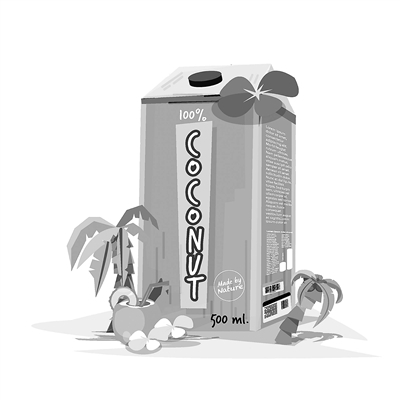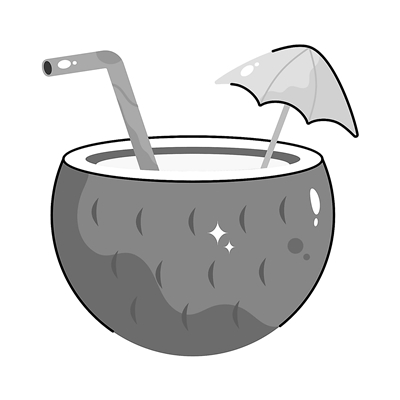

With the coming of summer, drinks to cool down and relieve summer heat have once again become people’s first choice. Natural coconut water is the "flow code" in the beverage industry in recent years. Not only do it often sell out of stock, but coffee, milk tea and other drinks made with coconut water often occupy the list of young people’s must-order. However, recently, some netizens discussed it hotly, because they bought coconuts that were opened in advance and drank coconut water inside, which caused discomfort. As a result, topics such as "Can you drink coconut water" and "Who is not suitable for drinking coconut water" have boarded the hot search.
Today, let’s take a look at the safety of coconut water, how to drink it is the healthiest, and who is the most suitable?
Drinking coconut water leads to vomiting, diarrhea and high fever?
The so-called coconut water is the clear liquid poured out from the coconut after it is cut open, which has a very light sweet taste and a unique natural flavor. Coconut water contains no fat, and the fat is all in the white coconut meat.
The reason why coconut water was on the hot search this time was because it brought some trouble. Netizens said that they bought a coconut with a pre-opened mouth and drank a few mouthfuls of coconut water, only to find that the coconut water was a little turbid. Then he felt dizzy and dizzy, and then he felt sick and vomited. After getting better, I didn’t go to the hospital for treatment, but I had a high fever the next day.
In fact, this high probability is caused by pathogenic bacteria or bacterial toxins in coconut water.
Originally, the coconut shell was tightly sealed to protect the coconut meat and coconut water inside and avoid the entry of external microorganisms. However, after opening, the coconut loses its sealability and will come into contact with the bacteria in the air and the bacteria on the opening tool.
Why is coconut after opening suitable for rapid propagation of microorganisms and bacteria?
Coconut water contains sugar, vitamins and minerals, which is suitable for rapid propagation of microorganisms. At the same time, coconut water, a "small fresh" fruit juice, has low acidity, and sugar and nutrients are directly dissolved in water instead of hidden in fruit cells, so its resistance to bacterial proliferation is too weak. It is weaker than orange juice, apple juice, tomato juice and other juices with certain acidity and polyphenols, so it is especially necessary to be careful.
If coconuts are stored at room temperature for a long time after opening, bacteria will multiply in large numbers, which may lead to bacterial food poisoning. Netizens found that the coconut water, which should have been clear, was a little turbid, which was the visual result caused by bacterial reproduction. This is exactly the same reason that egg soup, rice soup and noodle soup will go bad at room temperature.
Bacterial food poisoning may cause nausea and vomiting, abdominal pain and diarrhea, physical weakness, dizziness and headache, and even chills and fever.
Because the body is weak after food poisoning, other harmful microorganisms may take advantage of it, and there may be inflammation of the gastrointestinal tract and gums, or, as netizens have said, tonsils are in trouble again.
Deteriorated coconut water will produce mycotoxins?
Some people on the Internet say that the spoiled coconut water may produce Pseudomonas cocoanum, which will produce highly toxic mycotoxins. Because this case did not do microbial culture of coconut water samples, it is impossible to judge what kind of pathogenic bacteria or bacterial toxins caused the poisoning only by the symptoms.
It can only be said that coconut water contains carbohydrates. In an unsafe temperature environment, it can breed a variety of pathogenic bacteria and may also produce a variety of toxins, which cannot be prevented.
In a word, coconuts opened in advance have food safety risks. Consumers had better buy the whole coconut directly, and it is safer to ask the clerk or stall owner to open it at that time after buying it. It should be refrigerated immediately after opening, even if it is refrigerated, it is best to eat it on the same day. Eating coconut meat is the same.
Why can packaged coconut water be stored at room temperature?
100% coconut aquatic products on the market are sterilized and packaged. The bacteria inside have been killed, and the packaging outside is sealed, so microorganisms can’t get in, so it can be safely stored at room temperature for a long time before it is opened.
However, once opened, bacteria can enter, which is no longer safe and must be drunk as soon as possible.
What should I do if I don’t finish the coconut water in a big package at one time?
What if the package of coconut water is too big to drink at one time? Then pour out a part of it and drink it first. The rest of the box should be covered immediately and put back in the refrigerator for refrigeration. Never drink with your mouth to the bottle mouth, which will cause serious bacterial pollution. Even if it is refrigerated, it can’t last long. It is recommended to drink it all within 24 hours.
Not only coconut water, but also other liquid foods, such as milk, juice and drinks, need to be refrigerated in time after opening. How long it can be stored in the refrigerator depends on the product characteristics and sterilization process.
Generally speaking, products with particularly high acidity have slow microbial proliferation, such as lemon juice, cola, orange juice, etc., and they may not be spoiled or moldy even after being refrigerated for 48 hours.
Those drinks with low acidity should not be refrigerated for more than 24 hours in most cases.
Who is suitable for drinking coconut water?
Coconut water is not rich in various vitamins, but it is particularly rich in potassium, and the potassium content per 100 grams can be as high as more than 200 mg, while the sodium content is relatively low, with a small amount of calcium and magnesium. At the same time, the sugar content is still relatively low, only 3% to 6%, which is in line with the standard of low-sugar drinks (the sugar content in 100 ml is less than 5 g).
Because the osmotic pressure is not high and the sugar content is low, coconut water is a good hydrating drink. For northerners, compared with buying coconuts directly, it is more cost-effective to buy a large box of coconut water at a discount and drink it with the whole family.
Because of its high potassium content, low sugar content and low calories, coconut water is more suitable for patients with hyperuricemia and hypertension than other juices. Coconut water is also a good thing for people who eat too much salt, or too much meat, lack of fruits and vegetables, and imbalance of potassium and sodium.
If you add a little salt and some water, coconut water can also be used as a sports drink. If you drink it directly, because potassium is high and sodium is low, it is not enough to make up for the loss of sodium after sweating a lot.
However, people with kidney disease who need to limit potassium can’t drink a lot of coconut water.
Coconut water does not have the aroma of coconut meat, but the aroma is in fat. Coconut meat is emulsified and mixed with coconut water, or without coconut water, white water is added directly, and some sugar and emulsifier are added, which is the daily coconut milk.
There is no doubt that all milky drinks contain fat. This is true for milk, soy milk, peanut milk, walnut milk, and coconut milk. Milky white is the optical effect after fat emulsification. Therefore, milk-white coconut milk drinks, or coconut milk products used to mix desserts and drinks, have much higher calories than coconut water, and saturated fat accounts for about half of its fat. The aroma and taste are great, but the nutritional value of protein and vitamins is much lower than that of milk and soybean milk.
Text/Fan Zhihong (director of China Nutrition Society, chief expert of science communication hired by China Association for Science and Technology)